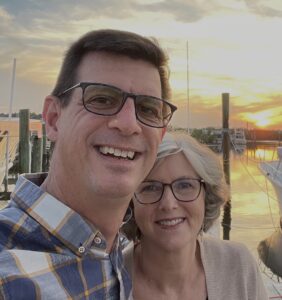 David grew up in the Midwest and moved to Papua New Guinea with his family when he was a senior in high school. After graduating, he stayed on another six months to help his parents with the ministry in the Aria tribe. God used this time in his life to show him the great need for tribal evangelization. In order to prepare for ministry God directed him to New Tribes Bible Institute. At the beginning of his second year he met Shirley for the first time. She is from Maine and she left her job as a medical assistant to go on a short term mission trip to the Ivory Coast. While working on a building project, God showed her that there are many groups of people around the world who need the Gospel. After completing Bible School in 1989, Dave and Shirley were married and entered into the missionary training with New Tribes Mission.
David grew up in the Midwest and moved to Papua New Guinea with his family when he was a senior in high school. After graduating, he stayed on another six months to help his parents with the ministry in the Aria tribe. God used this time in his life to show him the great need for tribal evangelization. In order to prepare for ministry God directed him to New Tribes Bible Institute. At the beginning of his second year he met Shirley for the first time. She is from Maine and she left her job as a medical assistant to go on a short term mission trip to the Ivory Coast. While working on a building project, God showed her that there are many groups of people around the world who need the Gospel. After completing Bible School in 1989, Dave and Shirley were married and entered into the missionary training with New Tribes Mission.
David and Shirley have worked as tribal church planters with the Ivanga people of Papua New Guinea since 1993. Their ministry has involved Bible translation, Bible teaching, discipleship and literacy. These ministries are carried out in the Ivangas’ own tribal language so that God’s Word can be communicated clearly.
In of March 2008 there was a huge need for Dorm Parents at the school our kids attend. The Lord burdened us with that need for someone to quickly stand in the gap. After two great years as dorm parents and one of those years Dave as the school administrator, the Lord used health issues to move us to a different area of PNG to serve in a support ministry for those missionaries working in remote locations. Now Dave works in the Field Office as the safety and security coordinator for the 300+ missionaries serving with NTM in Papua New Guinea. Shirley works as an education therapist in the special education department at the school for the missionary children. Even though Dave and Shirley are not working directly with the Ivanga church they still have close contact with them and make visits when they can. The church continues to grow in their understanding of God’s Word through faithful Bible teachers and they continue to be stretched and strengthened as leaders of the church there.
Ministry
Language and Culture study:
At the very start of working in the Ivanga Language group we began studying language and culture. The three and a half years spent in learning mode was not a waste. We are now using what we have learned to clearly teach and translate God’s Word, the Bible. If we tried to communicate in Ivanga without taking their culture into consideration it would be easy to cause confusion and difficult to build relationships with a foundation of trust.
Literacy: 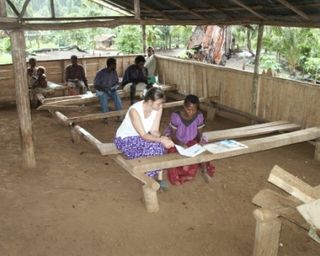
What a joy to see people young and old learning to read and write their own Ivanga language. This is vital, not just for discipleship and learning from the Bible, but also for practical needs like health and hygiene. Praise the Lord for faithful Ivanga literacy teachers who not only teach classes themselves, but can also train others to be teachers.
Chronological Bible Teaching: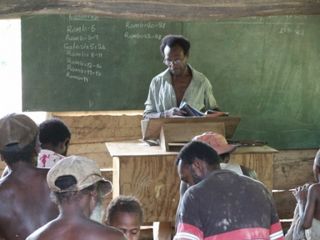 Yes, teaching through the Bible from Creation to Christ takes time, but in the end the Ivanga people, who accept Christ as their savior, have a good basis for their understanding of God and His Word.
Yes, teaching through the Bible from Creation to Christ takes time, but in the end the Ivanga people, who accept Christ as their savior, have a good basis for their understanding of God and His Word.
Translation:
God’s Word, the Bible, is necessary for the growth of the Ivanga church. It takes time and energy to translate the New 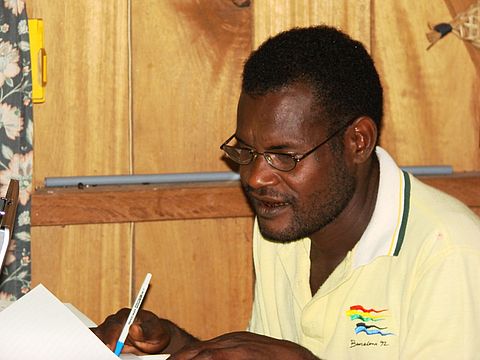 Testament into the Ivanga language. Not only is special care taken in getting every detail accurate, but making the verses flow and sound natural is very important. Pray for us and our Ivanga co-translators as we continue this long process.
Testament into the Ivanga language. Not only is special care taken in getting every detail accurate, but making the verses flow and sound natural is very important. Pray for us and our Ivanga co-translators as we continue this long process.
Discipleship:
Can we work ourselves out of a Job? Our goal is to see the Ivanga church functioning on New Testament principles and relying on the Holy Spirit and God’s Word to sustain them. Training leaders and teachers is a big part of discipleship. Training Ivanga men and women to train other Ivanga’s is our goal.
Medical:
The Ivanga are mostly located in very isolated 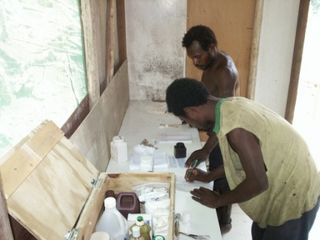 jungle areas, which means their healthcare is limited. In the village we live in the nearest aid-post is a half a day away either by hiking or canoe. This is why we are training two men to provide medical help for such things as malaria, dysentery, and infections.
jungle areas, which means their healthcare is limited. In the village we live in the nearest aid-post is a half a day away either by hiking or canoe. This is why we are training two men to provide medical help for such things as malaria, dysentery, and infections.
Ivanga Life
The Ivanga people number approximately 1,200 and live in isolated villages on the island of New Britain in Papua New Guinea (PNG). PNG is located just north of Australia and just south of the equator.
Climate: It is very tropical with temperatures in the 80’s and 90’s and with an average rainfall of 20 feet per year. It is very humid.
Travel: Roads are very scarce, if any, and timber companies in the area have the only vehicles. Most travel is done by foot over jungle trails and some use dug-out canoes to go by river. The nearest town is roughly a day and a half away.
Living: The Ivanga are subsistence farmers. They work very hard in their gardens and hunting in order to provide for their families. They grow sweet potatoes, taro, tapiok, greens, bananas, papaya and pineapple. The men hunt mainly for wild boar, birds and fish. They live in small one to two room houses made from hand hued planks with a sago palm leaf roof. If constructed well their house will last almost 2 years.